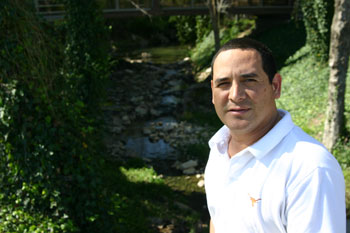When Edge Resources recently announced that it had partnered with an international nonprofit group to create a sustainably developed gas drilling property in south Arlington, local environmentalists and drilling critics probably perked up their ears. Getting the gas drilling industry to acknowledge and minimize the environmental effects of their activities is a battle that citizen groups have been fighting for a decade in North Texas, with only limited success.
Edge, a Fort Worth-based oil-and-gas company operating mainly in the Barnett Shale, has agreed to participate with Audubon International in its “sanctuary certification” program on its the eight-acre site along U.S. 287. Audubon, a nonprofit group not affiliated with the National Audubon Society, works in 26 countries with golf courses and other developments to address concerns such as water quality, retention of native plants, and wildlife habitat.
[pullquote_right]Edge officials this week declined to specify any measures they will be taking to protect the environment at or around their drilling site. [/pullquote_right]The Arlington City Council recently gave preliminary approval of the zoning permit needed for Edge to drill within the bounds of the 1,600-acre master-planned Tierra Verde development. The drilling site is known as the Overcoming Faith site because Edge bought the property from the nearby Overcoming Faith Christian Center and has leased mineral rights for the church property itself.
However, Edge officials this week declined to specify any measures they will be taking to protect the environment at or around their drilling site.
“At this time we are not prepared to disclose specific examples, since we are still in the planning and design stages,” said Edge Resources partner Mike Martinez. “We are committed to working with Audubon International and implementing as much as practically possible its recommendations. We have already conducted a tree survey identifying every tree on our land, and we are in the process of conducting a wildlife inventory.”
Martinez declined to say whether a “sustainably developed” drilling site would include any of the kinds of measures that drilling critics have called for in recent years, such as “green completion” systems to reduce venting of methane to the atmosphere, recycling of toxic wastewater, and use of equipment such as no-bleed valves and electric rather than diesel equipment engines, to reduce air pollution.
What’s more, Martinez and Audubon officials emphasized that the Audubon sanctuary program covers the area around the gas well, not any practices involved in the well drilling itself.
Jim Parajon, Arlington’s director of community and developmental planning, explained that the drill site, near Eden Road and U.S. 287, is part of a tract that is planned for high-end homes. The overall Tierra Verde Master Plan area, he said, is already certified with the Audubon group’s sanctuary program.
Parajon said he doesn’t believe the drill site’s being registered with Audubon will affect the council’s final decision on a specific-use permit. The permit was preliminarily approved on a 4-3 vote, but it must come back before the council for a final approval later this month. If the permit is approved, Martinez said, drilling is expected to begin this year.
“The critical factor is, would this be the appropriate locale for industrial use or not,” Parajon said. “This site is unique because immediately and adjacent to the south is the [city’s] Martin Luther King Sports Complex and Tierra Verde Golf Course. “
“We decided this was a once-in-a-lifetime opportunity to do something that hopefully can become a model for other companies when presented with similar circumstances,” said Martinez.
Joshua Conway, director of education and communication at Audubon International, said the south Arlington project also represents a first for his organization. “We will be learning as we go,” he said.
“Edge Resources is the first gas well operator to come to us and talk about the possibility of applying our program guidelines to a gas well site,” he said. “Because we are interested in working with any type of new development to make it the best that it can be from an environmental perspective, we decided that this was an opportunity whose time had come.
“Let me clarify that the membership, and therefore our input, is relative to the acreage surrounding the actual gas well,” he said, and not the well itself. “We are interested in working with that surrounding land to enhance and create habitat, protect water quality, create a trail system connecting to the city, and provide education for that community.”
Conway also noted that Audubon’s certification of the site is not guaranteed.
“Once construction is complete, continued involvement and possible certification through the program ensures that land managers utilize sustainable resource management practices for the long term,” he said.
“If a development, in this case a drill site, is going to happen, we would like to ensure that water quality and habitat is impacted as little as possible,” Conway said. “I would also like to reiterate that Edge Resources may never actually achieve certification, or we may decide that we cannot work with them because they are unwilling to follow our recommendations.”













[…] Audubon International membership listing DOES NOT LIST Edge Resources as a partner…this link here shows where the Ft Worth Weekly reported that they applied for membership for this Overcoming Faith […]
As of July 2015 I do not see that their name is listed as a partner in this endeavor to have a driller be an animal protector=FAIL?
http://auduboninternational.org/certified-members